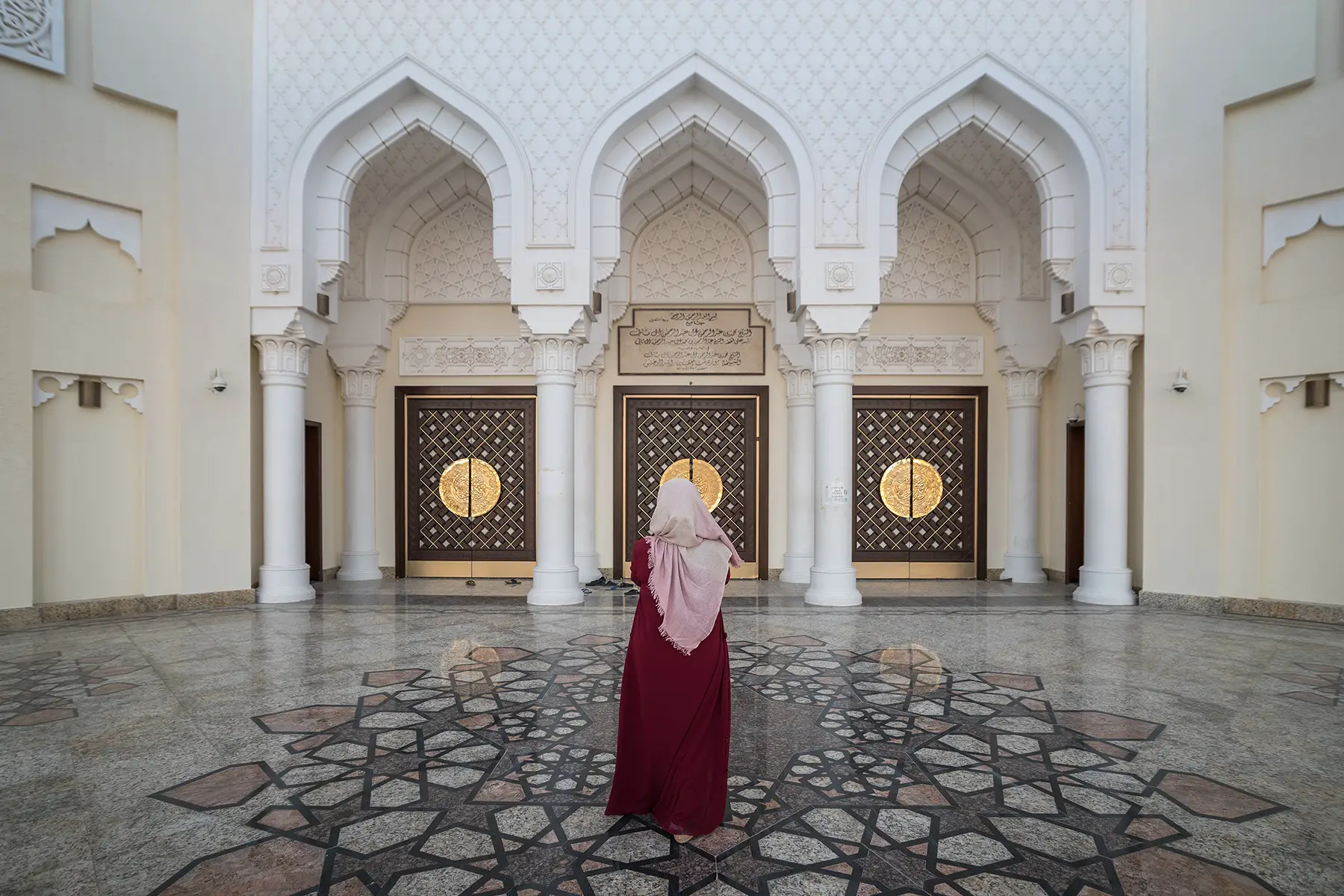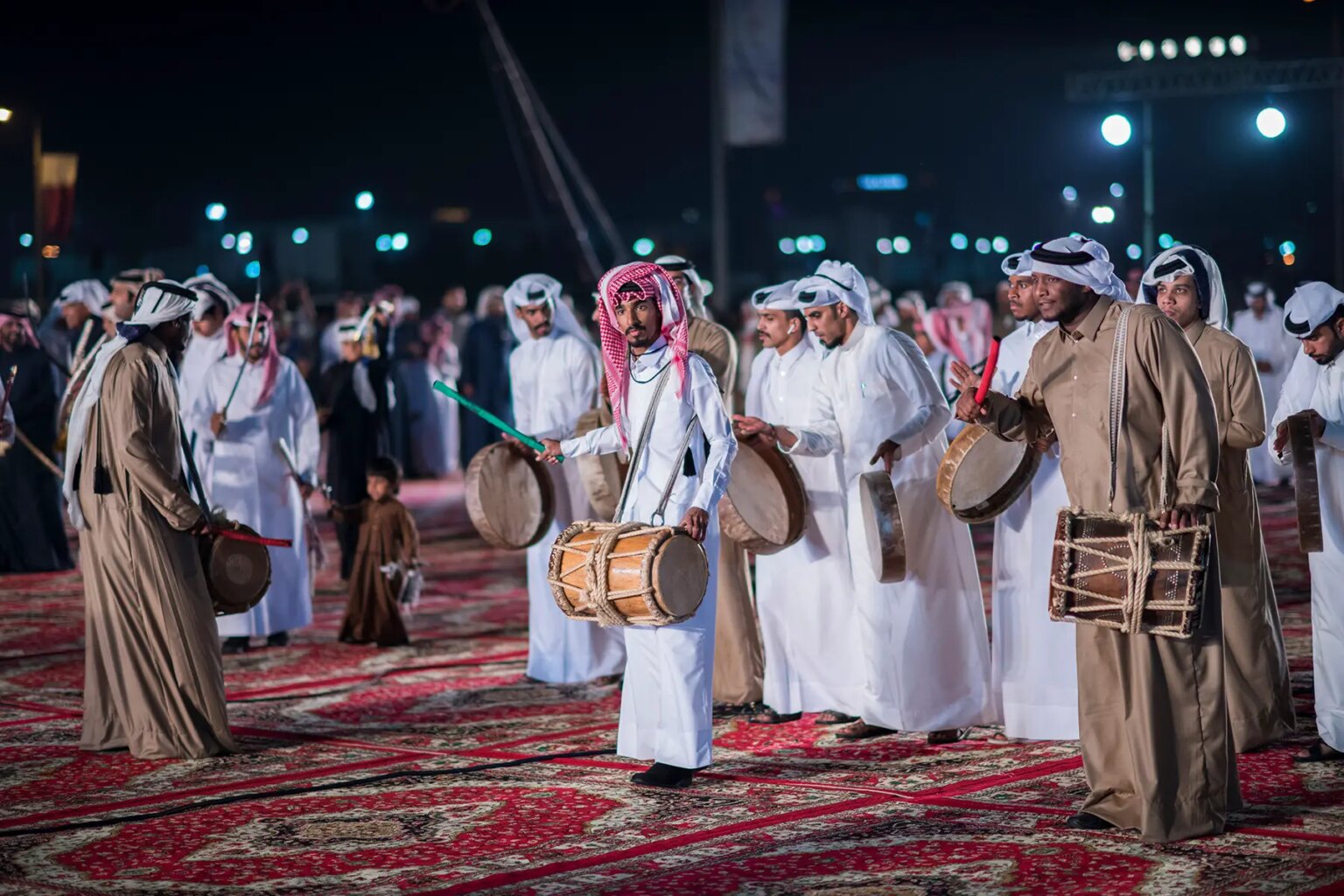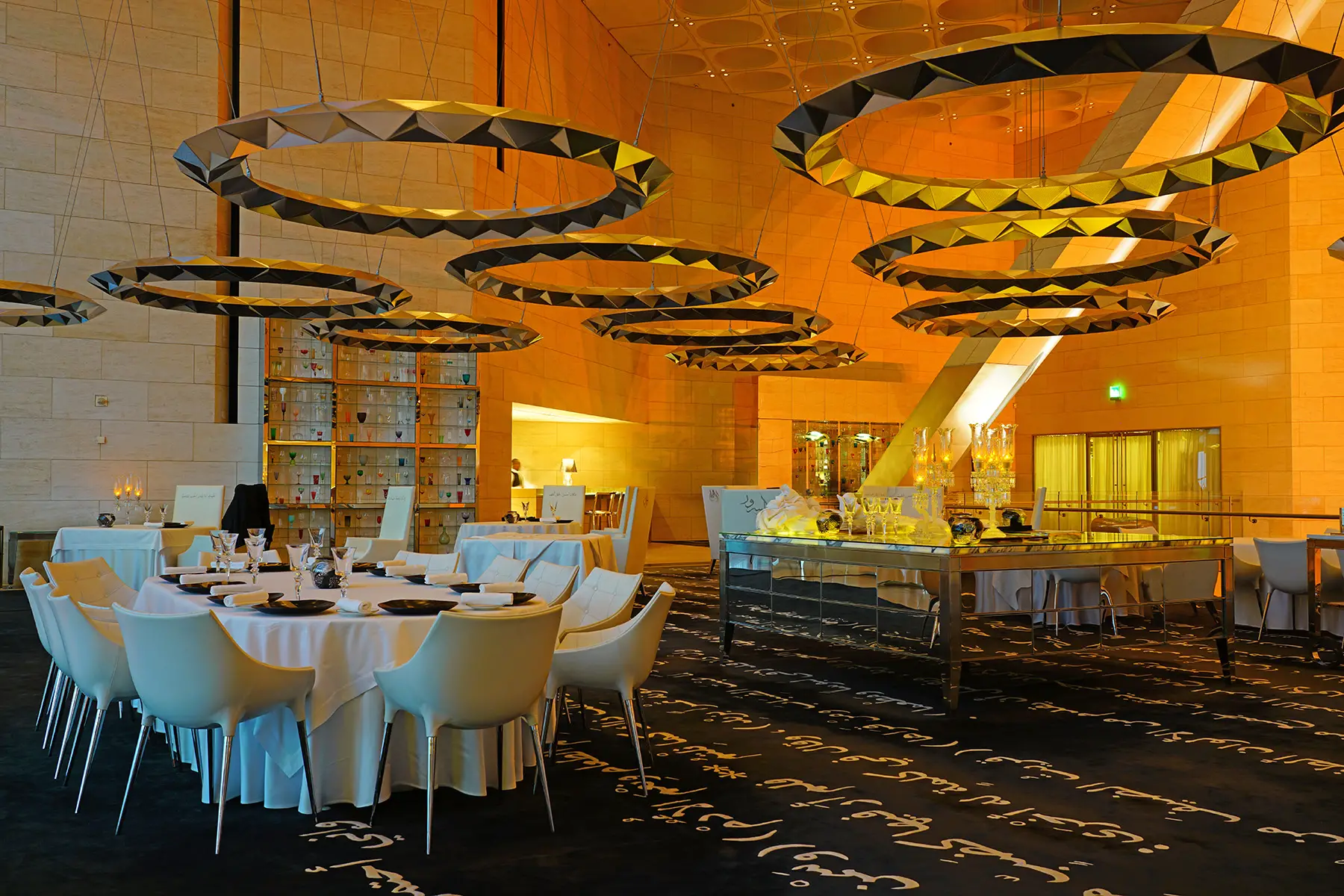The culture in Qatar is an exotic mix of past and future: the fascinating ancient traditions and the facilities of an ultramodern world. This guide explores the following topics:
- Qatar culture and society
- Gender roles in Qatar
- Meeting and greeting people in Qatar
- Conversation and communication in Qatar
- Clothing and dress code in Qatar
- Dining etiquette in Qatar
- Socializing in Qatar
- Relationships in Qatar
- Work and business culture in Qatar
- Shopping and services in Qatar
- Celebrations in Qatar
- Regional variations
- Tips on culture and etiquette in Qatar
- Useful resources
Qatar culture and society
In Qatar, the old traditions and architecture of the Arabian desert cohabit with spectacular skylines, worldwide culinary spots, and fancy cars. Besides this, numerous job opportunities, along with the high quality of life, attract millions of foreigners to this sunny country. As a result, Qatar is today a fascinating cultural mosaic and home to the second-largest expat community in the world.
Aside from the booming economy, which has flourished in the last few decades, Qatar has been investing highly in culture, as world-renowned museums, art galleries, film festivals, and open-air concerts. Without forgetting its past, the country strives to be forward-thinking and is working hard to change its traditional image to the outside world.
Language
The official language of Qatar is Arabic. Despite this, English is widely spoken in the country and, among the large expatriate community, Persian and Urdu are often spoken. Learning a few Arabic words and phrases can demonstrate your interest in the country and its language, and may help you to integrate more easily.
Religion
Islam is the official religion in Qatar, and the regime and government are linked to Islamic Sharia. Most Qataris are Muslim, however, the law does not impose restrictions on any other religious identity. According to the government website Hukoomi, Qatari law allows religious freedom, and society as a whole has a high level of tolerance towards different religious belief systems. Nevertheless, visitors and expats in Qatar should respect the Islamic faith of the country and its people.
National identity
The Qatari people are descendants of Bedouin; Arab-speaking nomadic groups who lived in the Middle Eastern deserts and maintained a tradition of generous hospitality. That said, Qatari society tends to be fairly conservative in most aspects, which is a result of heavy influences from Islamic traditions. Family, traditional architectural features, items associated with the nation’s past (such as desert nomadism, Bedouin tents and carpets, camels, maritime trade, and pearls), and images of the ruler are important national symbols.

Nationality and occupation form the basis of social structure in Qatar. The practice of hiring foreign workers has created a system in which certain nationalities work in particular job sectors, with salaries that are different depending on nationality. The largest division is between citizens and foreigners, with subdivisions based on the region of origin, genealogy, and cultural practices. On the other hand, Qataris are internally categorized according to tribal affiliation, religious sect, and historical links to settlement patterns.
Despite being the richest country in the world, Qatar presents large social inequality. However, it is addressing this issue by developing extensive social welfare programs, including free healthcare, primary education through university, housing grants, and subsidized utilities. In recent years, institutions have set up to support low-income families and disabled individuals through educational and job training programs.
Gender roles in Qatar
There is a very high ratio of men to women in Qatar society; men outnumber women by more than three to one. This is primarily due to the number of expatriate males. Gender imbalance is a challenge to Qatari society because it perpetuates gender culture and, subsequently, unequal gender rights between men and women.
Despite efforts to find a balance between traditional and modern culture, Qatar’s old-world values and customs, such as gender-segregated public environments, still exist and are core to national identity. Legal impediments, such as the male guardianship law, as well as cultural factors, mean that women are restrained from achieving their full potential. This not only negatively affects women but also men, and subsequently the country as a whole.
The consequences can be seen in the Gender Progress Index, released by business school INSEAD. In the Index, Qatar ranked in the bottom five for gender equality; at 117 out of 122 countries evaluated. This classifies Qatar as one of the most unequal societies in the world.
Women’s rights in Qatar
Despite the gap in gender equality, women do have rights in Qatar: they can vote, run for local elections, travel outside the country, participate in all parts of public and social life, and study. In fact, the majority of students in Qatari universities are female, which means that they maintain a high profile in professional and educational settings. Consequently, the labor force participation rate of Qatari women is higher than the world average (51%). Furthermore, Qatar’s government predicts that employment rates for women will continue as an upward trend. The majority of Qataris perceive female participation in the labor force as positive. In addition, many women aspire to be like Her Highness Sheikha Moza bint Nasser (the chairperson of Qatar Foundation for Education, Science, and Community Development), and work and study at all levels of society.
Among the largest obstacles to female employment are family obligations. Family is the foundation of Qatari society and structure, and as a typically patriarchal society, men sit at the head of the family. That said, divorce is legal in Qatar and divorce rates have been rising steadily, particularly among young couples.
Many female expats and travelers say they feel safe in Qatar, but it is quite common to receive invasive stares. More rarely, there are some cases of women being followed by cars or at the shopping mall. Despite these accounts of negative behavior – which is actually illegal – Qatar is generally a safe country with a low crime rate.
Meeting and greeting people in Qatar
The most common verbal greeting in the Gulf countries – Salam alaykum (literally, peace be upon you) – is often used by non-Muslims. This form of address is even used in official meetings, and the correct reply for it is wa alaykum as-salam (literally, and upon you be peace).

Depending on one’s gender, Qataris have distinct ways of greeting each other. For example, men tend to shake hands (always the right one) as a formal greeting. If you are in an informal environment and you know the person very well, you can kiss each other on the cheek (three times on the right cheek). However, if you meet a relative or a close friend, you can greet each other by touching noses twice. The same procedure can be followed by women when greeting formally. For relatives and close friends, they also kiss on the cheek (three times on the right side) and usually hug too.
However, greeting rules are different between men and women, and the best advice is to wait for the Qatari person to take the lead. Men and women do not normally touch, and while some Qatari women feel comfortable shaking hands with a man, others refrain from doing so. Similarly, men may refrain from extending their hand to women or even sitting beside them. The safest way to know if a woman agrees with shaking hands is to leave a distance and wait for her to extend her hand. If she does, it is okay to greet her by shaking hands. If not, then she may smile, greet verbally, or place her right hand on her heart as a greeting. Similarly, if a woman holds both hands together, it is also a sign that she doesn’t wish to shake them.
Conversation and communication in Qatar
Taboo topics
As a conservative country, it is advisable not to talk about sex, religion, or politics in Qatar. Even if your opinions about these topics seem reasonable to you, you should take into consideration that they come from a different perspective (perhaps western). Also, it is important to be aware that criticizing the emir is a crime (according to the constitution) and saying anything bad about the Prophet Mohammed is considered offensive.
Avoid asking locals personal questions – especially about female members of their family – and steer away from expressing admiration for their material possessions. Familiar privacy is a fundamental value for most Arabs.
Formalities
Qataris understand that expats are not familiar with all the local traditions. However, the hierarchy needs to be respected in Qatari organizations. Authority tends to follow the hierarchical structure (from senior to junior) or age. Elders are highly esteemed in Qatar society.
Like in other Middle Eastern countries, status is very important in Qatar, therefore titles should be used whenever possible. If you have doubts about it, check with someone beforehand to be sure.
Do not get straight to the point
Before starting any conversation – small talk, job interviews, or business meetings – it is polite to ask about the other person’s health (not detailed) and other trivial matters. They will ask you the same questions. This introduction can take a long time, as no one wishes to be the one who ends the ritual.
Body language in Qatar
An important aspect of understanding the culture and social etiquette in Qatar is to learn the codes of conduct surrounding body language and physical contact. Here are some key things to be aware of.
Hand gestures
Hand gestures in Qatar are serious matters and can cause you legal punishments, from fines to imprisonment. To prevent being misinterpreted, avoid the following gestures:
- Using your finger to ask (gesture) anyone to come to you or to point someone or something; instead, you may use your hand-palm.
- Doing the thumbs-up sign – it has an offensive connotation, like using the middle finger in western countries.
- Crossing legs – it can be interpreted as arrogance or as a sign of disrespect, especially if you are sitting in front of an aged person or someone of a higher hierarchical position.
- Lifting the sole of your shoes in front of people or making a gesture with your feet to anyone.
Non-verbal communication
On the other hand, body language or non-verbal communication is quite common in Arabic cultures, such as the following gestures:
- Touching all your fingertips together while holding your hand out means to be patient or to wait.
- Holding your hand outwards with the palm down and then suddenly twisting it upwards means “Why?” or “What?”.
- Tilting your head to the side with a smile usually means yes.
- Leaning your head back with your chin and eyebrows raised also means no.
- Placing your right hand on your heart is a warm way to greet someone.
- Quickly raising your eyebrows up and down with a serious face means something is not satisfactory.
Touching
Religious law in Qatar prohibits unmarried men and women from touching. The exception to this rule is the handshake in a formal greeting – which people can refrain from as a sign of respect. However, touching the arms or shoulders while talking is quite common between people from the same gender who have a certain level of intimacy.
Clothing and dress code in Qatar
National dress
Qatari society is heavily influenced by Islamic customs, therefore the dress code is generally traditional and conservative. Women and men wear the National dress. Qatari Arab men usually wear a flowing white full-length robe (thawb) – over trousers and an undershirt – with smart sandals and a keffiyeh (a white headscarf draped over the head) held on with a black rope. Meanwhile, Qatari Arab women wear a full-length black dress (abaya) – generally over Western clothing – but others wear the veil (hijab). Their traditional dress is often decorated with gold or silver embroidery. Although still conservative, the dress for Qatari women is much less formal than in neighboring Saudi Arabia.

On formal occasions, the standard office wear for men is a long-sleeved shirt, tie, and lightweight trousers. Suits are rarely worn, except during important business meetings. For women, the acceptable work attire is dresses, trousers/skirts (always below knee length), with a modest neckline, and no less than half a sleeve.
While local Qataris do wear traditional dress, they do not expect foreigners to do the same. However, there are certain dress codes that everyone should follow. Men should avoid wearing shorts and sleeveless shirts in the street. Women should avoid wearing revealing clothes that do not cover shoulders and knees, or that are tight or transparent, in public spaces. This dress code extends to public beaches. Both men and women should refrain from wearing bikinis and swimming suits. In spite of this, rules are more flexible at resorts and hotels, where guests can wear beach attire (except for tiny bikinis or thong bottoms, for example).
The dress-code law is a serious topic for the government, and breaking it can result in punishments predicted by the penal code. In 2012, a Qatari NGO launched an informative campaign to warn the many foreigners about public decency laws.
Dining etiquette in Qatar
Accepting invitations
Being invited to a Qatari’s house is a great opportunity to experience a new culture and become acquainted with local people. And if the etiquette is followed in the right way, Qatar people tend to be very hospitable and friendly.
However, if you receive an invite to someone’s home, don’t assume that you can take your partner/family too; it is not common for Qataris to entertain couples or families. If they want your partner/family to come, they will make it clear when they invite you, and if it happens, you will not always sit together. Also, it is polite – but not mandatory – to bring a small gift (sweets, flowers, or housewarming souvenirs) or a small dish to share.
Being a guest in someone’s home
Once you are at the host’s home, always remove your shoes when entering the majlis – the reception room for visitors – and accept (with your right hand) everything that your hosts offer you to eat or drink. In Arabic culture sharing a meal is a way to show affection and create bonds, therefore it is rude not to accept hospitality.
When you are full, just leave a very small portion of food on your plate and your host will understand. And don’t feel strange if you are invited to sit (cross-legged) on the floor and eat with your hands. Your host may provide cutlery for people who don’t know how to eat with their hands, and older people are always served first. Before eating or drinking for the first time, say “Bismillah”; and after finishing the dinner, say “Alhamdulillah” to thank the host.
Finally, it is very important to know that you should never show up at an Arab’s house without warning them that you are coming first, as they have a very strong sense of family privacy.
Dining etiquette in restaurants
When eating in restaurants, you can call the waiter using the palm of your hand, but do not raise your index finger. In formal situations, pay attention to the seating arrangement. And, finally, arguing for the dinner bill is common, and a Qatari will usually win. The venue will often add a service charge to your bill, but if not, then a 10% tip is appropriate.
Socializing in Qatar
Expats represent almost 85% of the total population of Qatar. Most of these people live in compounds or apartment buildings which are provided by their employers, so more often than not, your first contact with other foreigners starts there.
Once you are in the country, you can join many associations to meet new friends with the same interests as you. People also join online forums before their arrival, to connect with experienced expats and receive advice.
But while socializing with other foreigners may seem like an easy task, the same can’t always be said about making friends with local residents. Not speaking Arabic can be an obstacle for total integration, as well as religious customs.
Nightlife in Qatar
Qatar’s nightlife is concentrated in Doha, where you can choose between nightclubs, concerts, lounges, bars, and restaurants. Most of these are located around or inside international hotels. However, be aware that drinking alcohol in public is prohibited in Qatar and only licensed places can sell alcoholic drinks. It is also prohibited to appear in public while drunk.
If you are a morning person, there are many activities for you in Qatar. The largest hotels offer services like brunches, spa treatments, swimming pools, and saunas. You can do more than just shop at malls, too; these often contain movie theaters, casual cafes, beauty salons, sports complexes, restaurants, and even art galleries.
During Ramadan, you cannot eat or drink in public between sunrise and sunset, even for non-Muslims. Restaurants will probably not be open during these times.
Relationships in Qatar
Local dating scene
Dating a Qatari follows some pretty specific rules. Couples can talk on the phone, by text, and via email, but they can only meet if a family member comes with them. In this case, the young man can also see the young woman uncovered. However, you can only date if you already intend to marry. The couple will address marriage conditions during this period; this might include things such as the bride’s desire to work after marriage or to be the only wife. After a final agreement, the couple will arrange a pre-marriage counseling session.
Expat dating scene
It is not common for an expat to date a Qatari man or woman. The main reason for this is that most of them are already engaged with other Qatari men or women. Besides, Western women tend to be more liberal when it comes to social customs, which does not align with the values of Qatari (or Muslim) men in general. Another important fact to consider about relationships with natives is that marriages between Muslim men and Christian women are not allowed in Qatar (except with the permission of the Sharia Courts).
For this reason, you will have permission to marry a Qatari, but only if you convert yourself to Islam, which makes dating a Qatari more unlikely. Even if you are a Muslim already, from another country, things can be complicated.
According to Hukoomi, Qatari men who wish to marry non-Qatari women must receive permission from the Marriages Committee, which can be denied. Given these obstacles, the most common situation in Qatar is for foreigners to date other foreigners. That said, it is important that expats understand that certain public expressions of affection, such as kissing or hugging, are illegal in Qatar; especially in family-friendly spaces. These actions can result in a fine or banishment from the place.
Family
Family is the foundation of Qatari society and refers to a group bigger than the domestic unit. After marriage, women remain members of their father’s lineage but are partially integrated into their husband’s too. The preference is to live with, or at least close to, the members of their husband’s family; either in a single extended household, walled family compounds with separate houses, or the same neighborhood.
Even when adjusted to meet the demands of a modern world, most marriages in Qatar are arranged. Young men and women are more frequently meeting at work and school, for example, and choosing their prospective partners themselves. However, the arrangement process remains the same, and both partners still have the opportunity to decline it. Before the wedding, Qataris must attend a series of pre-marriage counseling and education programs. A premarital medical screening is also mandatory for all, to combat genetic risk.
Marriage
Muslim marriage ceremonies in Qatar take part in the Sharia Court. There is no civil marriage option for non-Muslims, however, some embassies and churches can perform marriages for non-Qataris as you cannot live as a couple out of wedlock.
Although polygyny is religiously and legally sanctioned, people no longer follow this practice in Qatar. In fact, a wife can even divorce her husband if he marries another woman. Incidentally, divorce rates have been rising in Qatar since 1980.
Weddings have more than one celebration and can happen over several days. Generally speaking, women celebrate in one section of the house and men in another. On the last night of the celebrations, the couple meets and are accompanied by relatives of the groom, as well as some close friends.
Women often wear gowns and men wear thobes and swords; they can also wear a suit or any other suitable wedding attire. For the special night, the groom wears a black cloak over a white thobe and the bride dresses in a traditional white gown.
Same-sex relationships
Same-sex relationships are illegal in Qatar and can result in punishment, according to the Islamic Sharia Law. The penalty for engaging in same-sex sexual relations with people over the age of 16 is seven years imprisonment. The law also says that believers should neither participate in nor support homosexuality.
Despite these laws, people are rarely arrested and punished for homosexual crimes. This is due to the fact that Islam strongly emphasizes an individual’s right to privacy. Therefore, if a crime does not occur in the public sphere, it is largely overlooked as an issue between the individual and God.
Work and business culture in Qatar
Patience is a gift
Business meetings in Qatar can take longer than in Western countries. This is due to the different cultural rituals and the fact that people in the Gulf are more relaxed and slow. They are not so strict with punctuality either, which means that it is not offensive if the meeting starts a little late.
It is also customary to make small talk with each other before jumping straight into business matters. If you do this, they will likely assume that you are impatient or not personally interested in them. Qataris will take their time to ask you about general health, family, mutual acquaintances, and so on. They will also appreciate it if you try to keep the conversation going.
And when you do officially start to talk business, you may have several interruptions such as prayer times, phone calls, and colleagues queries. Also, try to avoid showing even the slightest sign of annoyance or impatience. Finally, remember that the typical working week runs from Sunday to Thursday – from 7:30 to 12:00, and from 15:30 to 19:00.
Shopping and services in Qatar
Customer service
There is a joke that shopping is the national sport of Qatar – and it’s not hard to see why. From browsing the local souks (marketplaces) to exploring the futuristic shopping mall complexes, Qataris are savvy when it comes to buying and selling. But what if something goes wrong? What can you expect in the way of customer service?

According to Hukoomi, “the Consumer Protection Law provides protection covering all products and services whether charged for or given to the consumer free of charge. The Law permits citizens to set up consumer rights societies and groups that help provide consumers with information, defend consumers’ interests, convey concerns and complaints to relevant authorities.”
Here are some useful numbers for customer service hotlines.
Opening hours
- Banks are open from 7:30 to 13:00 – from Sunday to Thursday.
- Malls are open from 10:00 to 22:00 (banks within shopping malls usually keep mall hours) – Sunday to Sunday.
- Business times change during the Holy Month of Ramadan.
Celebrations in Qatar
Holidays
Qatar has four national holidays in total, as follows:
- Qatar National Day: December 18 (annually);
- National Sports Day on Tuesday of the second week of February (annually);
- The holy Eid Al-Fitr (also called the Festival of Breaking the Fast, which marks the end of Ramadan);
- The holy Eid Al-Adha (also called the Festival of the Sacrifice; the second of two Islamic holidays celebrated worldwide each year).

People organize special activities at different locations around the country to celebrate these holidays, such as cultural events, concerts, and firework displays.
Ramadan
Ramadan is the Holy month for Muslims. During this period, Muslims must fast between sunrise and sunset. Therefore during the daylight hours, the country is relatively quiet. However, when the sun goes down, locals enjoy a celebratory atmosphere almost every night of the week. Currently, Ramadan is a summer event, but there isn’t a precise date as, with many things in the Islamic calendar, it depends on the cycle of the moon. People cannot eat or drink in public during Ramadan, except for young children, pregnant and menstruating ladies, the elderly, and the chronically ill.
Birthdays
Celebrating birthdays is not a part of Islamic tradition, however, there is no explicit text forbidding it. That said, celebrating a child’s birthday is usual in Qatar, and it does have some positive effects.
Gifts
People encourage gift-giving in Islamic culture, especially during Ramadan. Muslims can give and receive gifts such as perfumes, clothes, and livestock, but the most traditional gift of Islam is food.
Regional variations
Qatar’s population is urban and coastal: 70% of residents live in the capital city, Doha, which is also the major administrative, commercial, and cultural center. Just a few Qataris retain the traditional nomadic lifestyle from the old times; mostly in the north of the peninsula, where we can find rare vestiges of vegetation and irrigated farming areas.
As Qatari citizens constitute only a small portion (15%) of the total population today (about 2,7 million people) and live in a concentrated area of the country, there isn’t a large variation in culture, norms, and behavior among the regions. As the number of foreign workers who live there – mostly from Pakistan, India, and Iran – have far outnumbered the natives, you can expect to find an exciting mix of cultural influences. For this reason, Qatar boasts a rich and diverse culinary scene.
Tips on culture and etiquette in Qatar
Qatar is an extremely traditional country, but the modern and western appearance may mislead people into forgetting its conservative heritage. Therefore, it is important to observe the culture and social etiquette in Qatar. If you follow the social codes of conduct you will avoid any misunderstandings or getting into trouble with the law. The following tips – listed on the Qatari Ministry of Foreign Affairs site – may be useful:
- You may not express some emotions publicly as this may lead to your arrest and imprisonment, as per the law;
- Avoid taking photographs of military installations or other people without their consent, especially Arab ladies;
- You must stand up to greet or welcome newcomers, particularly elderly people or high ranking people. You should use the Islamic greeting salamu alaykum to the older people;
- Use your right hand to accept drinks offered to you;
- One should shake the Arabian coffee cup if you do not want more;
- When a man meets a Qatari woman, he should avoid shaking hand with her unless she first offers her hand for shaking;
- You should not offer your Muslim guests any alcoholic drinks or foods with pig meat contents;
- Non-Muslims can have alcoholic drinks at hotels (provided there is a special permit for this) or their homes. However, they cannot appear in public while drunk;
- Non-Muslims do not have to fast during the sacred month of Ramadan. However, they should abstain from eating, drinking, and smoking in public from dawn to dusk;
- One should not forget to take off their shoes as they get in a Majlis (the place of receiving guests in a private house). If a woman accompanies you, you should direct her to another hall for ladies. Have some food or drink before you talk about anything. Sharing a meal with your host will please him;
- The country also applies a zero-tolerance attitude towards the use and possession of illegal drugs. You cannot import pork, too.
Useful resources
Here are some useful links to further information on culture and social etiquette in Qatar:








